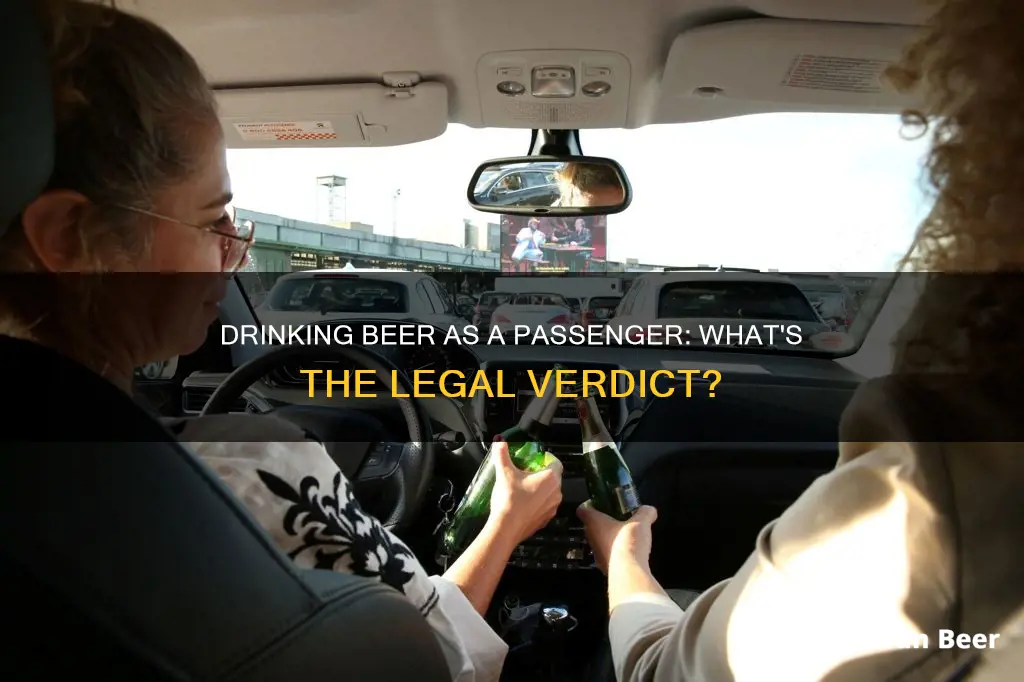
Drinking and driving is illegal in all states. But what about drinking as a passenger? Well, that depends on the state and the circumstances. While most states prohibit passengers from drinking alcohol in a vehicle, some states, including Connecticut, Delaware, Missouri, and Mississippi, don't have open container restrictions. Additionally, some states, like Tennessee, Virginia, and Rhode Island, don't have open container rules that apply to passengers. In certain municipalities, like the French Quarter in New Orleans, exceptions to open container laws have been made to boost tourism, allowing passengers to have open containers of alcohol. However, in most states, passengers can be cited for infractions such as open container charges, public intoxication, or other traffic violations. So, while it may be legal to drink as a passenger in certain states, it's important to be aware of the specific laws and regulations in your area to avoid any potential legal consequences.
What You'll Learn
- Drinking beer as a passenger in a car is illegal in most states
- In some states, passengers can drink beer in a car without restrictions
- Open containers of beer are allowed in certain vehicles, like taxis
- Drinking beer as a passenger is permitted on private property
- In some states, passengers can be cited for drinking beer in a car

Drinking beer as a passenger in a car is illegal in most states
An open container is defined as any alcoholic beverage container with a broken seal, a missing cap, or some contents removed. This includes cans, bottles, or other containers with broken seals. In most states, if a passenger has an open container, both the passenger and the driver can be charged with a crime.
The laws regarding open containers in vehicles were established to reduce alcohol-related traffic fatalities and have been effective in doing so. While you may not face a charge of driving under the influence (DUI) as a passenger, you can still be cited for other infractions such as an open alcohol container charge or public intoxication.
It is important to note that there are some exceptions to these laws. For example, passengers are generally allowed to consume alcohol in limousines, party buses, and the living quarters of motor homes. Additionally, drinking as a passenger is permitted in certain states, including Connecticut, Delaware, Missouri, Tennessee, and Virginia.
To avoid any legal issues, it is essential to be aware of the specific open container and drinking laws in your state, as they can vary. These laws can have significant consequences, including fines, jail time, or the loss of driving privileges.
Beer and Penicillin: Safe Mix or Health Risk?
You may want to see also

In some states, passengers can drink beer in a car without restrictions
Drinking alcohol in a car is illegal in most states. However, some states have more relaxed open-container laws, allowing passengers to carry open alcoholic beverages while someone else operates a vehicle. These states include Connecticut, Delaware, Mississippi, Missouri, Tennessee, Virginia, and West Virginia.
In these states, passengers can drink beer in a car without restrictions. However, it's important to note that local ordinances may still prohibit open containers of alcohol, and the laws may vary between municipalities. For example, in the French Quarter of New Orleans, known for its drive-thru frozen cocktail vendors, passengers are allowed to have open containers of alcohol in vehicles, as long as the driver is not drinking.
Additionally, some states have unique laws regarding the transportation of open alcoholic containers. For instance, in Hawaii, you can carry beer, liquor, and wine, while in Kansas, you can only carry alcoholic liquor.
It's also worth noting that, even in states with more relaxed open-container laws, there are usually exceptions for certain types of vehicles. For example, motorhomes and hired vehicles, such as taxis, are often exempt from these laws, as long as passengers are drinking in the living areas or the back seat.
Whisky and Beer: A Match Made in Heaven?
You may want to see also

Open containers of beer are allowed in certain vehicles, like taxis
Open containers of beer are generally prohibited in vehicles, but there are exceptions to this rule. In the United States, open containers of alcohol are banned in the entire passenger area of a motor vehicle, as per the Transportation Equity Act for the 21st Century (TEA-21). However, this law does not apply to certain types of vehicles, such as taxis, limousines, or party buses.
If you are a passenger in a taxi, you are allowed to have an open container of beer. This is because taxis are considered vehicles-for-hire, and many states permit passengers to drink alcohol and possess open containers in such vehicles. The same applies to limousines and party buses, where passengers in the passenger area are generally allowed to possess open containers of alcohol.
It is important to note that local ordinances may prohibit open containers of alcohol in vehicles, even in states that do not have open container restrictions. Additionally, you must still be of legal drinking age, which is 21 years old in the United States, to drink alcohol in these vehicles.
While open containers of beer are allowed in certain vehicles like taxis, it is essential to be aware of the specific laws and regulations in your state or location, as they may vary.
Underage Beer Drinking: Exploring the Legal Drinking Age Limits
You may want to see also

Drinking beer as a passenger is permitted on private property
Some states, such as Connecticut, Delaware, Missouri, and Mississippi, don't have open container restrictions. Several other states, including Tennessee, Virginia, and Rhode Island, don't have open container rules that apply to passengers. In these states, passengers may be able to drink beer in a vehicle, regardless of whether it is on private property or not.
In addition, certain types of vehicles are often exempt from open container laws. For example, passengers are typically allowed to drink alcohol in the living areas of motorhomes and hired vehicles such as limousines and taxis.
It's important to note that open container laws vary by state, and local ordinances may also apply. As a result, it's always a good idea to check the specific laws and regulations in your area.
Beer Drinking and Liver Cirrhosis: What's the Link?
You may want to see also

In some states, passengers can be cited for drinking beer in a car
Drinking alcohol as a passenger in a car is a complex issue that varies depending on the state and the circumstances. While it is generally prohibited to have open containers of alcohol in a vehicle, some states have more lenient laws.
In some states, passengers can indeed be cited for drinking beer in a car, as open container laws apply to all occupants of the vehicle. These laws typically define an "open container" as one with a broken seal or where some contents have been removed. However, there are exceptions to these laws in certain states.
For example, in Connecticut, Delaware, Missouri, Tennessee, and Virginia, passengers are allowed to drink alcohol in a car without restriction. In Alaska, drinking is permitted behind a solid partition separating the driver and passenger areas. Rhode Island's law states that no person shall operate a motor vehicle with an unsealed container in the passenger section, but it does not prohibit consumption by passengers when the vehicle is not being operated.
Additionally, passengers may be able to drink alcohol in a car on private property or in certain types of vehicles, such as hired limousines or party buses.
It's important to note that even if drinking as a passenger is allowed in certain states, public intoxication or other related charges may still apply. The laws around open containers and drinking in vehicles can be complex, and it's always best to check the specific regulations for your state.
Ear Piercing and Beer: What's Safe?
You may want to see also
Frequently asked questions
It depends on where you are. Most states prohibit drinking alcohol in vehicles, but there are exceptions. For example, in Connecticut, Delaware, Missouri, and Mississippi, there are no open container restrictions. In Alaska, passengers can drink if the open container is "behind a solid partition that separates the vehicle driver from the area normally occupied by passengers". In some states, passengers can drink on private property, in hired vehicles, or in the living areas of motorhomes.
An open container is any container of alcohol with a broken seal. The seal doesn't have to be completely broken—if the container has been opened at all, it counts as open.
If you're caught drinking as a passenger, you could be cited for an open container violation, public intoxication, or other traffic violations. The specific penalties vary by state, but you may face a fine, jail time, or a loss of driving privileges.







